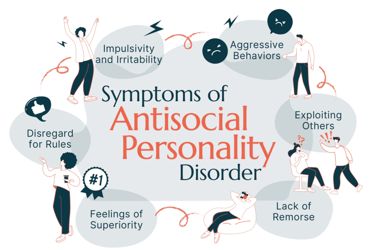Do Psychopaths Actually Exist? The Truth About ASPD and Media Myths
Do Psychopaths Actually Exist? The Truth About ASPD and Media Myths Are psychopaths even real? Or have movies, true crime documentaries, and news headlines sold us a one-dimensional myth?
5/12/20254 min read


Do Psychopaths Actually Exist? (And What That Term Really Means)
The Myth of the "Psychopath"
Hollywood loves a good villain, and few labels carry more weight than the term psychopath. It’s dramatic, ominous, and instantly gives us an idea of who the “bad guy” is supposed to be. But what if I told you the term "psychopath" has no clinical meaning at all?
Confused? You’re not alone. Let’s break down the history, science, and stereotypes behind the idea of a "psychopath" and explore what the reality actually looks like today.
Why Are We Talking About Psychopaths on a Death Channel?
Yes, it’s a bit of a stretch. But since the term "psychopath" is commonly associated with murderers and violent criminals, it does circle back to death and dying. And that’s enough of a connection for us to roll with it—plus, if it all falls apart, we’re blaming Gary. Let’s dive in.
Psychopaths & Sociopaths: Not Real Diagnoses
Let’s clear something up right away: psychopath and sociopath are not clinical terms. They don’t appear in diagnostic manuals like the DSM-5, and they’re not used by professionals to officially diagnose anyone. They’re just layman’s terms—like "insane" or "split personality"—which might sound dramatic but are outdated and inaccurate.
The actual diagnosis that people often mean when they say "psychopath" is Antisocial Personality Disorder (ASPD).
A Brief History of the Term "Psychopath"
In the early 1900s, the term psychopath was used to describe people who seemed cold, manipulative, or criminal. It was a placeholder—an early attempt at understanding behaviours that didn’t yet have a name.
"Psychopathy" comes from the Greek words psyche (soul/mind) and pathy (suffering).
It evolved over time, shaped by psychiatrists trying to categorize behaviour.
Later came the term sociopathy—focusing more on people who break social rules.
By the mid-20th century, these terms merged into something closer to what we now call ASPD.
Over time, the psychiatric community refined these ideas into proper criteria, eventually creating a formal diagnosis—Antisocial Personality Disorder. But by then, Hollywood and media had already run with the word psychopath, and it stuck.
The Clinical Reality: Antisocial Personality Disorder (ASPD)
Antisocial Personality Disorder isn’t just a catch-all for “bad people.” It’s a spectrum, and someone can show mild or extreme traits. Here's what the DSM-5 says:
To be diagnosed with ASPD, a person must:
Be at least 18 years old.
Have had conduct disorder before age 15.
Show at least 3 of the following traits since age 15:
Repeated law-breaking
Lying and manipulation
Impulsivity
Aggressiveness or physical fights
Recklessness
Irresponsibility
Lack of remorse
It’s important to notice a few things:
Empathy isn’t mentioned in the official criteria.
Not everyone with ASPD is violent or criminal.
You only need 3 traits to qualify—so there are many ways this can look in real life.
Why the Criminal Connection?
If ASPD doesn’t require criminal behaviour, why do so many people think it does?
There are a few reasons:
1. Research Bias
In early psychiatric research, where did doctors look for people with "psychopathic" traits? Prisons. That skewed the research early on, creating a false association between ASPD and criminality. It’s like how early autism studies only focused on boys—bias in the data creates bias in perception.
2. Media and Hollywood
Movies, news stories, and true crime podcasts love using the word psychopath. It’s easy shorthand for a villain. But again, it’s not a diagnosis. Most serial killers aren’t actually diagnosed with ASPD—and many people who are, never commit a crime.
3. Assumptions About Motivation
People assume ASPD equals sadistic, violent urges. But the reality is more nuanced. Most people with ASPD just want what everyone else wants—careers, relationships, success. The difference is how they might go about getting it.
In fact, some traits of ASPD—like fearlessness or emotional detachment—can actually help people succeed in high-pressure jobs. That’s why some CEOs or politicians may meet the criteria for ASPD and still be successful.
Meet James Fallon: The “Functional Psychopath”
One of the most compelling examples is James Fallon, a neuroscientist who discovered he had the brain of a psychopath—completely by accident. He’d never committed a crime. He had a loving family and a successful career. His story, told in the book The Psychopath Inside, shows that ASPD isn’t a life sentence—it’s a brain wiring that can show up in many different ways depending on your environment and choices.
So… Can Kids Be Psychopaths?
Short answer: no.
You can’t be diagnosed with ASPD until you’re 18. Why? Because all kids are impulsive, selfish, and reckless—it’s part of developing a brain. A child may be diagnosed with Conduct Disorder, and if those traits continue into adulthood, they might eventually be diagnosed with ASPD. But we don’t label kids as psychopaths. Ever.
Conclusion: Let’s Be Real About This Label
The word psychopath has been so distorted by pop culture that it’s hard to have honest conversations about what ASPD really is. But hopefully, after reading this, you’ll see that the reality is far more complex—and far less dramatic—than the Hollywood version.
Want to Learn More?
🎥 Watch the full YouTube video above for more insights.
📥 Download our digital resources for a deeper dive into death, psychology, and everything in between.
🧠 Book a one-on-one session with Sam for personal guidance, questions, or support.



